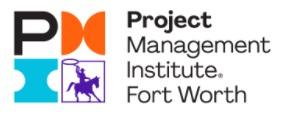Military Outreach Mission:
The FWPMI MOT leads military outreach activities within the chapter and in the local community by building relationships through the promotion of PMI values, processes, skills and certifications to local military personnel. The MOT then leverages these relationships in applying assistance to transitioning veterans to accelerate their path to PMI certifications leading to a career in project management.
FWPMI Military Outreach
- Benito Gonzalez - FWPMI Military Outreach Manager
- Preston Pelfrey, PMP
- John Koren, PMP
- Agnita Jackson, PMP
- Brett Hadley, PMP
- Joshua Cunio, PMP
- Xavier Herrera
- Brandon Phillips
- Ryan Zingraff, PMP
If you are interested in joining this team or have any questions, please email MilitaryOutreach@fwpmi.org.



